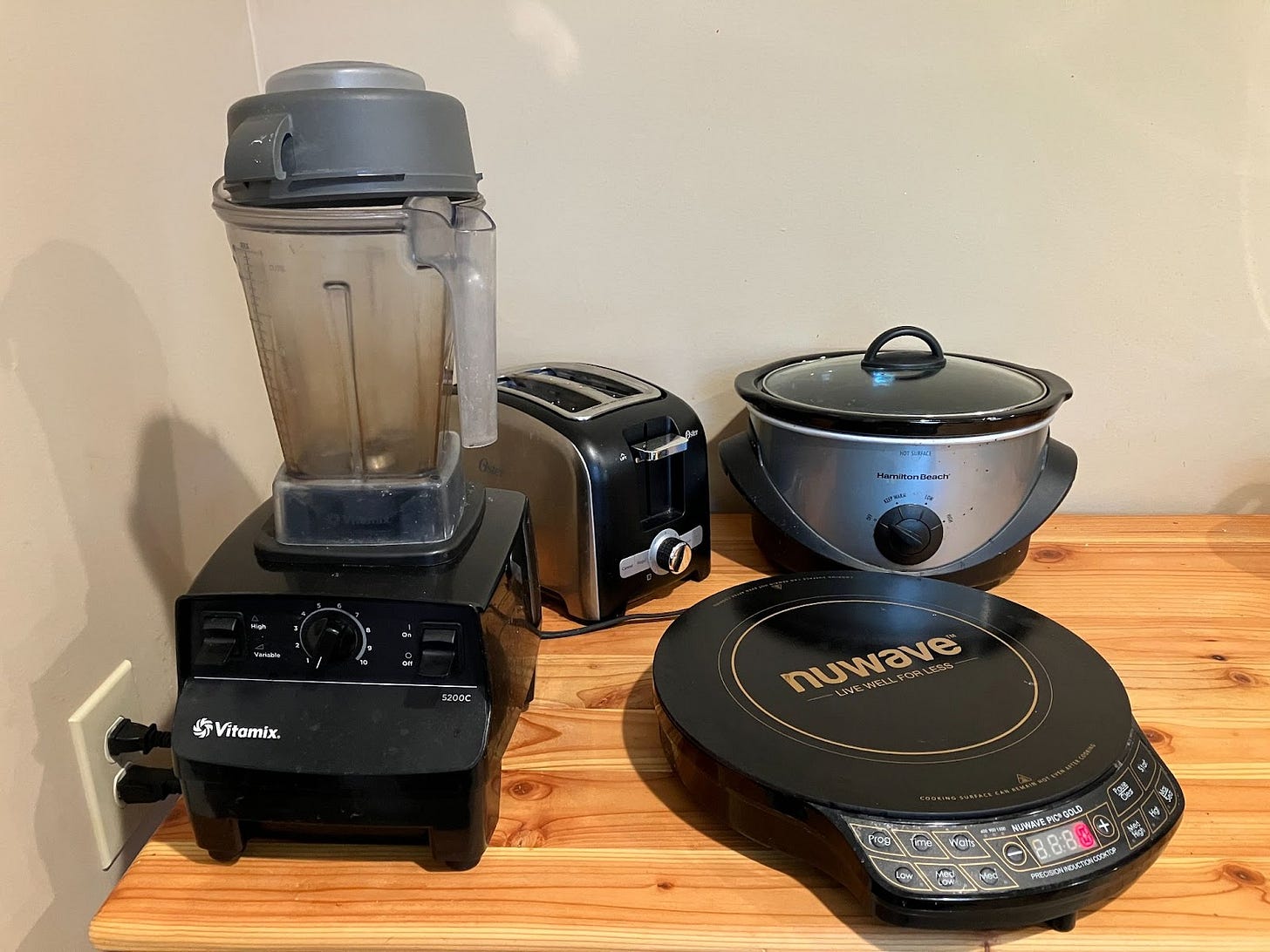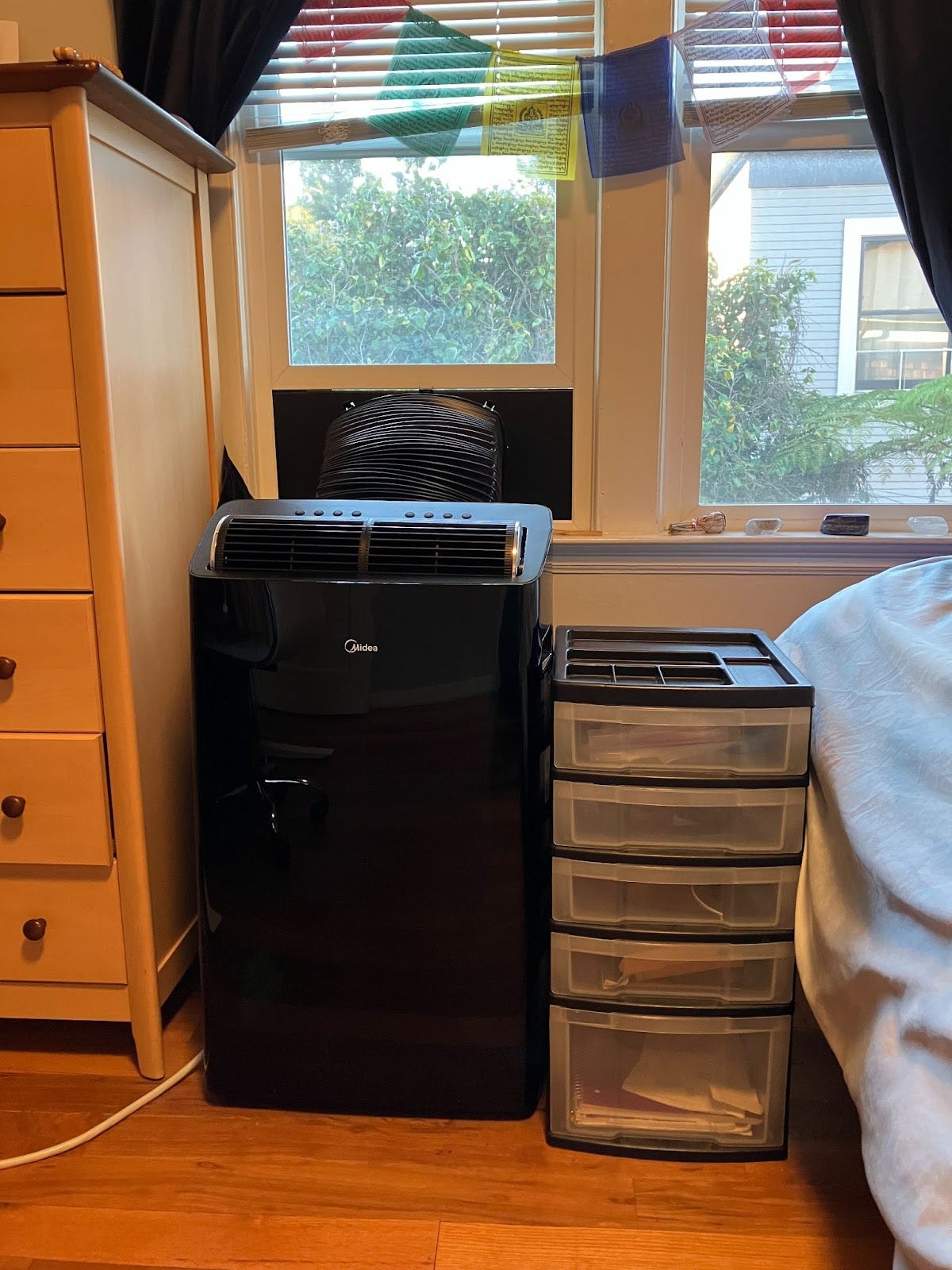How to Persuade Your Landlord to Switch Your Rental to All-Electric Appliances
And, how to electrify your home as a renter
Do you want to live in an all-electric home that does not rely on fossil fuel “natural” gas for cooking, heating, clothes drying and water heating?
There are many benefits to making this switch, such as:
Better health: You can reduce the risk of asthma and exposure to carcinogens like benzene in your kitchen by avoiding burning gas in your home.
Better for the planet:
Better for outdoor air quality: in the San Francisco bay area, gas appliances contribute more to smog than cars!
Lower utility bills: You can save money on energy costs by using heat pumps, which are more efficient and stable than gas furnaces, even in cold weather. In fact, heat pumps outsold gas furnaces in the U.S. last year.

What does it mean to switch your building to run on clean electricity rather than gas appliances?
To go all-electric, you will need to consider a few home renovations and upgrades:
First, check the insulation of your building. This will help you reduce the energy needed for heating and cooling, as it will keep the indoor temperature more comfortable throughout the year.
If you have the option to add solar panels and battery storage, that also helps with lowering utility bills.
The four main appliances that may be running on gas, which you can upgrade to run on electricity, are:
Gas stove -> induction stove
Water heater -> heat pump water heater
Gas furnace for heating -> heat pump HVAC (also provides cooling)
Gas dryer -> heat pump dryer

If you are a renter, you may not have much control over these appliances, but you can still make some changes. For example, you can replace a window AC unit with a window heat pump that can cool or heat one room, such as the Midea (above) or the Gradient.
However, window heat pumps can be costly and limited in coverage, so you may want to talk to your landlord (possibly with other tenants in the building) about upgrading the whole system.
If you share laundry and water heating facilities with other tenants, you will need to convince your landlord to replace the gas-powered dryer and water heater with electric ones. (That is, until city governments require landlords to make these upgrades.) Here are some tips on how to do that:
So, here’s a sample letter that you and other tenants in your building can sign and send as a group to your landlord to share the benefits of all-electric homes. This example is based on some recent news applicable to residents in the 9-county San Francisco bay area. Let me know how this works for you in the comments!
*** SHORT VERSION - CALIFORNIA (email) ***
Subject: Important: New regulations on appliance replacement
Dear Landlord name,
Did you hear about the new regulations on indoor air quality requiring appliance replacement?
In 2023, the Bay Area Air Quality Management District (BAAQMD) voted to pass regulation on phasing out gas water and space heating appliances by 2027 and 2029, respectively.
This means that when our water heater and gas furnace breaks, you’ll need to replace it with an electric version, such as a heat pump water heater, and an air or ground source heat pump.
I understand that this may seem like a hassle, but I think it would be better for both of us to plan ahead and make the switch sooner rather than later. Not only will you avoid the risk of having a broken appliance in the middle of winter, but you will also benefit from the tax incentives offered by the 2022 Inflation Reduction Act. You can find incentives here. Don’t wait til it’s too late and contractors might be hard to find!
Example upgrade times while we’re on vacation
To minimize disruptions to tenants and help you make upgrades quickly, here are some upcoming vacation dates we plan to take where you can come in and do the work of replacing appliances:
Tenant name A – Date X to Date Y
Tenant name B – Date X to Date Y
Tenant name C – Date X to Date Y
Tenant name D – Date X to Date Y
Thanks,
Tenant Name 1
Tenant Name 2
Tenant Name 3
[include all the tenants in your building if possible]
*** LONG VERSION ***
Dear [Landlord name],
Did you know that you have a unique opportunity to improve both the financial value of your property AND help the planet by making a few changes to your rental property?
We’d like to share some resources on how you can help your properties go all-electric.
And, we’d like to give you a heads up on some new San Francisco Bay Area regulations. We hope to help you plan ahead to avoid the hassle of last-minute appliance upgrades.
New regulations on indoor air quality requiring appliance replacement
In 2023, the Bay Area Air Quality Management District (BAAQMD) voted to pass regulation on phasing out gas water and space heating appliances by 2027 and 2029, respectively. These appliances release NOx (nitrogen oxides) which contribute to particulate matter and greatly affect air quality. This means that when our water heater and gas furnace breaks, you’ll need to replace it with an electric version, such as a heat pump water heater, and an air or ground source heat pump.
Would you rather deal with a broken furnace on a weekend in the winter when it’s rainy and cold, or come up with a plan to replace that before next winter so you can do it on your schedule?
All-electric homes mean health benefits to renters and a more desirable property
Having all-electric rental properties is more desirable, because of the negative health impacts of gas appliances (gas stoves are linked to increased asthma rates as well as respiratory conditions, neurological disease, heart attack, stroke, lung cancer and premature death).
Tax incentives are available
The 2022 Inflation Reduction Act provides a number of incentives for landlords to increase home energy efficiency (such as by improving insulation) as well as home electrification upgrades. See here from the Department of Energy for details or find incentives here. Please note that these incentives expire in 2030, so you’ll want to have a plan for taking advantage of these across your properties in the next few years.
Help reduce greenhouse gas emissions
[IF YOUR LANDLORD IS A PUBLIC COMPANY]
The SEC may require reporting of greenhouse gas emissions (including carbon dioxide and methane, among others) for scope 3 emissions, which are from the supply chain of a company. Scope 3 includes 15 categories, of which two are relevant to your business: category 13, downstream leased assets (owned by your company), as well as category 15: investments (relevant to your investors). See details here from the SEC and a summary here from McKinsey. Having all-electric appliances in your properties can help you reduce what emissions you may need to report if that rule goes into place.
[FOR CALIFORNIA LANDLORDS]
Going all-electric is better for the planet, with the electric grid is increasingly getting powered by renewable energy (with California’s grid coming from 34.5% solar and wind and 59% from zero carbon sources total, currently).
Example upgrade times
To minimize disruptions to tenants and help you make upgrades quickly, here are some upcoming vacation dates we plan to take where you can come in and do the work of replacing appliances:
Tenant name A – Date X to Date Y
Tenant name B – Date X to Date Y
Tenant name C – Date X to Date Y
Tenant name D – Date X to Date Y
Can you start with replacing our gas stove with an induction stove? We’re really interested in this Energy Storage Equipped one from Channing St Copper, because it has a built-in battery which could power our fridge in the event that the power goes out.
If you’re not sure where to start, please check out these resources:
Nonprofit - California/Washington: The Switch is On (from the Building Decarbonization Coalition). There, you can:
Speak to an expert (a “Switch is On Ambassador”) - note these are volunteers, not necessarily licensed contractors, so this may be best if you are comfortable project managing your own renovations or “going DIY.”
Find a contractor (an excellent directory in California - includes contractors who process BayREN, Tech Clean CA, and other rebates; some limited info for Washington state in King, Pierce, and Thurston county as of February 2024)
Find incentives (California + Washington state only currently)
Nonprofit - National-ish: Rewiring America - they are training a network of volunteer “electric coaches” - Note these are volunteers, not necessarily licensed contractors, so this may be best if you are comfortable project managing your own renovations or “going DIY.”
For-Profit Companies Providing More Extensive Services
Northeast U.S. (NY, NJ, CT, Philadelphia area, Chicago area, Pittsburgh PA) - Sealed does everything as a service (design, contractor selection, and construction project management). Pricing is in a payment plan model where you pay them monthly for the improvements they make.
New York & Massachusetts: Jane Energy provides home electrification plans and support. Pricing is based on a fee-for-service model.
Massachusetts + Colorado: Helio Home serves the Denver, Golden, and Boulder areas and Elephant Energy serves the Front Range in Colorado and the Greater Boston area.
Colorado, California, Massachusetts: Zero Home is based in Denver, CO and is doing a pilot with the MassCEC and with Los Altos Hills, CA.
Colorado - My Electric Home is a solopreneur company providing home electrification plans and support. Pricing is based on a fee-for-service model.
California: QuitCarbon provides home electrification plans and support. Pricing is built into the contractor rates.
Northern California - Electrify My Home is a contractor serving northern California (Sacramento area, Vacaville, Berkeley) that also does trainings for PG&E contractors and Tech Clean CA rebate programs on home electrification. They do home energy assessments, heat pump HVAC + heat pump water heater installations primarily. Note they do not do whole-home work (not induction stoves, not panel/service upgrade work, not solar/batteries).
List of US + some international organizations doing various levels of home electrification support (mix of for-profit and nonprofit)
List of home electrification companies from ClimateTechList
Sincerely,
Tenant Name 1
Tenant Name 2
Tenant Name 3
[include all the tenants in your building if possible]




